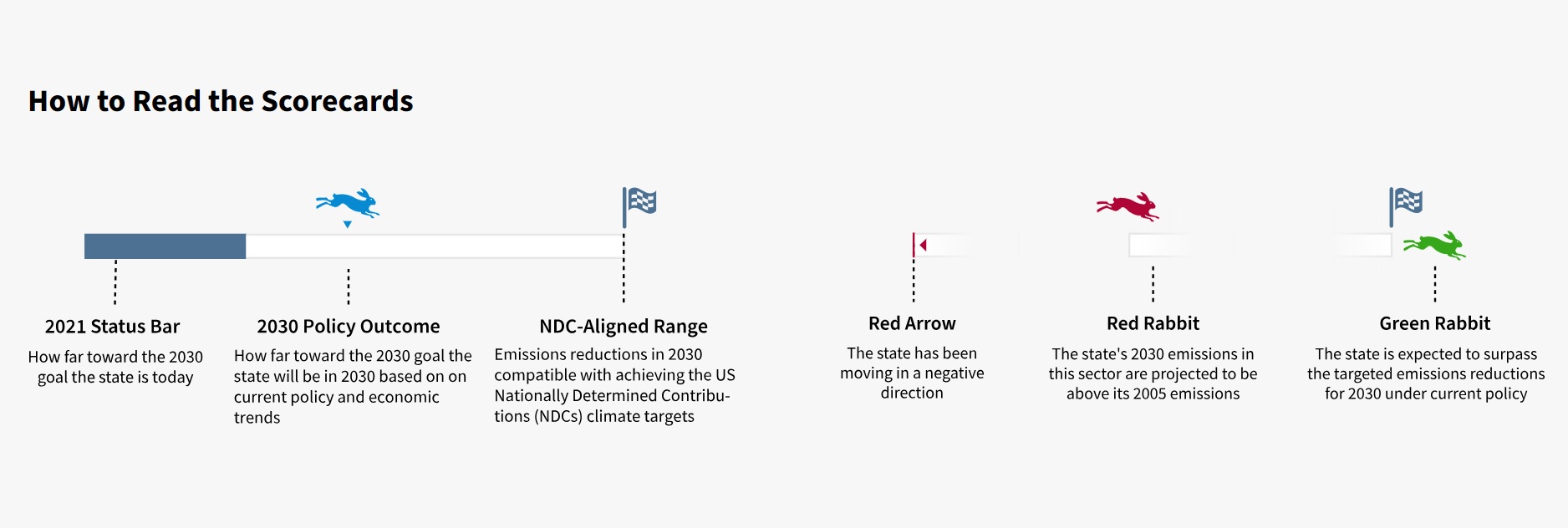Rocky Mountain Institute presents updated climate policy scorecards for 20 states, tracking progress to 2030.
State governments are playing important roles in advancing the climate agenda in the United States, however, some are innovating faster than others, setting examples for others to follow. RMI released data dashboards and state scorecards for 20 states, which assess where states are at in terms of reducing emissions.
Climate policies take many shapes from Maryland setting an ambitious clean energy target, to Massachusetts with its green bank for housing, to Minnesota’s binding transportation emissions standards, and Colorado’s passage of an innovative industry package.
The Inflation Reduction Act (IRA), signed into law by U.S. President Joe Biden last August, is the largest climate and energy spending package in U.S. history. The bill includes $600 billion in spending, $370 billion of which is dedicated to renewables and climate resilience. The IRA mandates a nationwide reduction of carbon emissions by roughly 40% in 2030 and aims for energy savings for Americans.
The IRA, along with the Infrastructure Investment and Jobs Act, CHIPS and other federal policies, are incentivizing states to maximize these benefits for its residents and businesses. The RMI scorecards assess the progress that states are making in enacting policy that, if implemented collectively, would put the U.S. on the path to achieving its Nationally Determined Contribution (NDC) target. The NDC target is part of the Paris Agreements, which set the U.S. on a path to reducing emissions by 50% to 52% below 2005 levels by 2030.
Some economy-wide policies noted in the report are those in Washington, New York, Massachusetts and Colorado. Washington, for example, has a carbon pricing program. Most notably, Washington’s policies put its entire economy on track to reduce emissions to levels lower than those defined by an NDC policy package. Colorado recently passed tax credits aimed at accelerating the uptake of clean technologies across sectors.
Building and industry policy is lacking in most states, according to the report, however New York has adopted innovative building performance standards and the major city policy, Local Law 97, is seen in the scorecard as a driver of near-term building emissions reductions. Colorado is incentivizing use of clean hydrogen in high-impact industrial end uses.
Other policies that the scorecard authors would like to see in greater numbers include zero-emission vehicle standards, EV adoption, heat pump uptake, renewable portfolio standards, and strong building codes.

To create the scorecards, RMI chose a group of 20 states with significant emissions that also have diversity of industries, geographic location and political makeup. RMI partnered with Climate XChange to collect and review every major state climate policy passed before June 2023 for those 20 states. It used the state-specific Energy Policy Simulator (EPS) models, an open-source data tool co-developed by Energy Innovation and RMI, to quantify the impact of current policies in 2030. Then the group compared 2030 emissions from the current policy scenario with the state’s emissions in 2005, a common emissions benchmark year for climate targets, and an NDC-aligned scenario based on a policy package that achieves US climate targets.
Taking the good with the bad, in addition to tracking progress at the economy-wide and sector levels, the state scorecards show which sub-sector level metrics across states are the furthest behind when it comes to meeting NDC-alignment.



